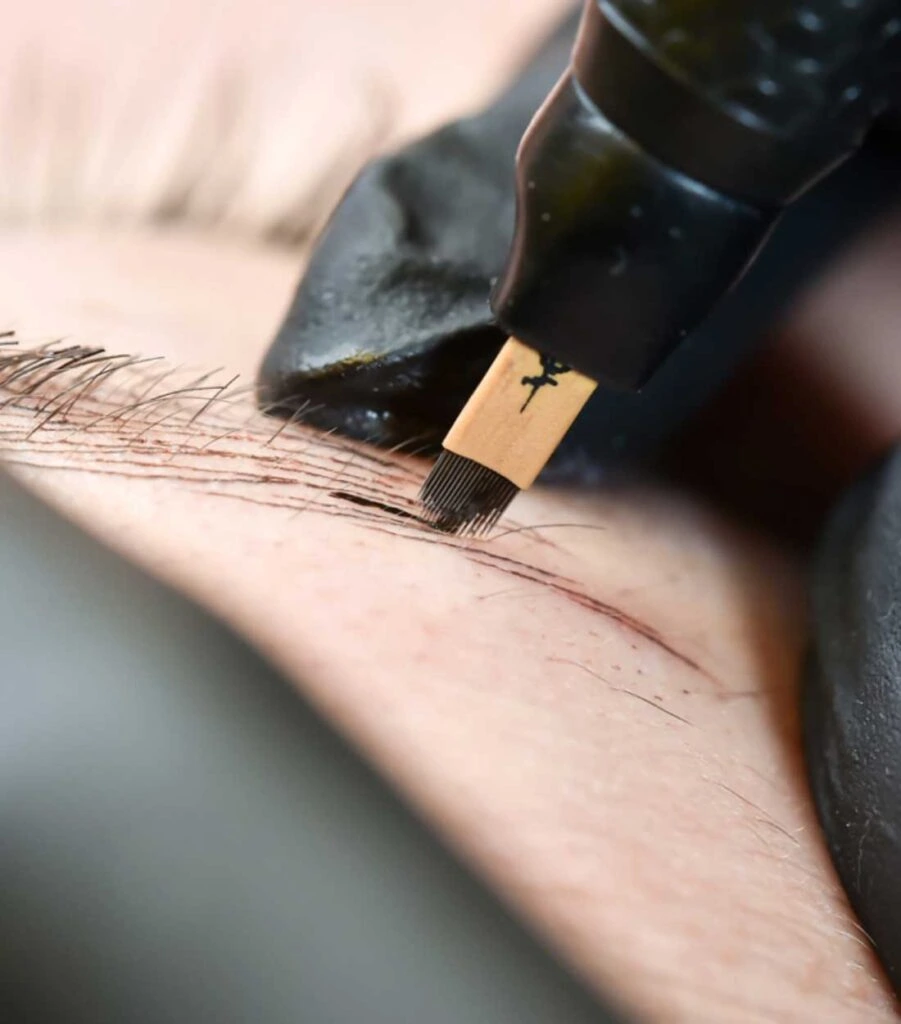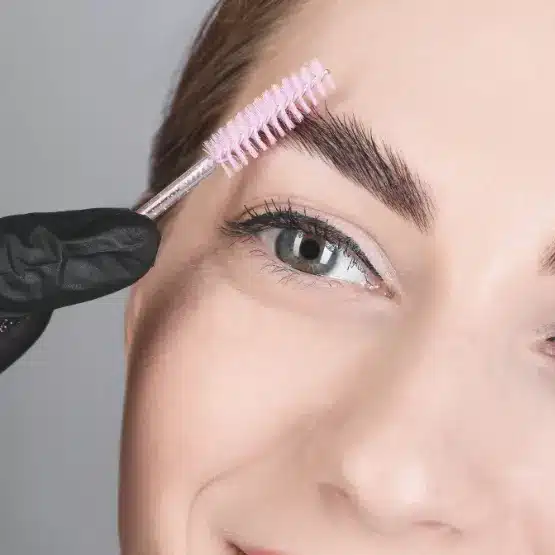Microblading in Houston
Houston’s Leading Brow Studio
Transform your brows with precision and artistry at Dermaluxe Spa in Houston. Our skilled artists create soft, natural, long-lasting results tailored to your style. Experience beautifully sculpted brows that enhance your features with expert microblading.

What is Microblading?
Microblading is a permanent makeup technique that enhances the shape, fullness, and definition of your brows using fine, hair-like strokes. Each stroke is carefully placed to blend seamlessly with your natural brow hair, creating a realistic, full appearance.
At Dermaluxe Spa, our award-winning artists customize every treatment to match your skin tone, facial features, and desired style. The result is beautifully shaped brows that look soft, natural, and effortless.
Online brow Quiz
Which Brow Style Should You Rock?
Take our online brow quiz online. It’s a quick and easy way to guide you on your brow journey.
Your perfect brows are just a few clicks away.

What to expect
Perfect brows every day
Your microblading experience begins with a detailed consultation to understand your goals and design the perfect brow shape for your face. Using the Golden Ratio mapping method, we outline your brows to achieve ideal symmetry and balance.
Once the shape is approved, we select the perfect pigment to match your natural hair and skin tone. Our artists then use a specialized hand tool to gently implant pigment into the skin, creating precise, realistic hair strokes that mimic natural growth.
The process takes about two hours, and results last anywhere from one to three years depending on skin type, lifestyle, and aftercare.
FAQS
Is a consultation required for microblading?
Important Information for All New Permanent Makeup Clients
Photos: When booking online, please upload clear photos of your brows or email them to contact@dermaluxespa.comwithin 24 hours. This helps us review your brows ahead of time and ensure you’re a suitable candidate for permanent makeup.
Consultation: While an in-person consultation isn’t always required, it is necessary if you’ve previously had permanent makeup done by another artist. This allows us to evaluate your existing work and determine the best course of action.
Deposit Policy: Please note, if you arrive for your appointment and we are unable to proceed due to prior work from another provider and no consultation was performed, your deposit will be forfeited.
We look forward to welcoming you to Dermaluxe Spa in Houston and being part of your beauty journey.
What should I know before my microblading appointment?
Brow Pre-Care: What to Know Before Your Permanent Makeup Appointment
To get the best results from your brow procedure at Dermaluxe Spa, please follow these guidelines:
Avoid plucking, waxing, or tweezing your brows in the week leading up to your appointment.
Do not use dyes, bleaches, or semi-permanent gels that stain the skin in the brow area.
Refrain from taking blood-thinning supplements or medications such as Aspirin, Fish Oil, Niacin, Vitamin E, and Ibuprofen for 48–72 hours prior (unless medically necessary).
Avoid alcohol and caffeine for at least 48 hours before your procedure, as they can increase sensitivity and bleeding.
If you’re on anticoagulants, consult your doctor and get permission to stop usage for at least 5 days before your appointment.
Hydrate well the day before—healthy, hydrated skin heals better.
Schedule Botox, Dysport, or Xeomin at least 2 weeks before or after your brow tattoo.
No chemical peels or laser treatments on the face for 6 weeks before your appointment.
Stop using prescription retinoids (like Retin-A) at least 2 weeks prior.
Avoid tanning or sun exposure to the brow area for at least 2 weeks before and after treatment.
What should I do after my microblading appointment?
Healing times can vary depending on your skin and the area treated, but following proper aftercare is essential for the best results. For the first 10 days after your permanent makeup treatment, please avoid the following:
Touching the Area: Keep hands away to prevent introducing bacteria or causing infection.
Picking or Scratching: Let any scabbing or flaking naturally shed—picking can lead to pigment loss or scarring.
Water Exposure: Keep the area dry. Avoid long showers, swimming, hot tubs, or steam rooms.
Sweating: Skip intense workouts and saunas, as sweat can disrupt the healing process.
Makeup: Do not apply makeup on or near the treated area until it’s fully healed to avoid irritation or infection.
Skincare Products: Avoid lotions, exfoliants, retinoids, or acids on the treated area unless specifically advised.
Sun Exposure: Protect the area from direct sunlight and skip tanning beds to prevent fading and irritation.
Sleeping on Your Face: Try to sleep on your back to avoid pressure and friction on the healing area.
Alcohol and Caffeine: Limit both, as they can thin your blood and potentially slow the healing process.
Facial Treatments: Postpone any facials, chemical peels, or laser treatments until your skin is fully healed.
Following these steps helps preserve your results and ensures a smooth healing experience. Always refer to the personalized instructions given to you at your appointment.
How long does the microblading procedure take?
The duration varies depending on the area being treated and the complexity of the design. Typically, a session can last anywhere from 1 to 3 hours.
What is microblading and how long does it last?
Microblading is a wonderful way to enhance your natural beauty, and it’s designed to last for a good while. Typically, it can last anywhere from 1 to 3 years, and often even longer, depending on factors such as your skin type, aftercare routine, and lifestyle habits.
Individuals with oily skin may find that the pigments fade faster. Similarly, those who engage in activities that cause excessive sweating, such as hot yoga, swimming, or sun exposure, may also notice quicker fading. On the other hand, individuals with normal to dry skin may find that the pigments last longer. Additionally, people who take good care of their skin by avoiding exfoliants and acids around the brow area that may cause fading, may also find that the results last longer.
Are touch-ups necessary?
Yes, touch-ups are often necessary for microblading. The initial application may not achieve the desired color intensity, so a touch-up helps fine-tune the pigment. Some areas may fade more quickly than others, and a touch-up ensures even color distribution. Adjustments may also be needed to perfect the shape and symmetry. Additionally, touch-ups help maintain the appearance over time, as all permanent makeup gradually fades. We recommend a touch-up within 6-8 weeks after the initial procedure, with maintenance touch-ups every 1-2 years depending on the individual’s skin type and lifestyle.
Can you correct previous microblading done elsewhere?
It depends on the individual whether we can fix microblading done elsewhere. In most cases, we are able to help, but at times we may not accept clients. Several factors come into play, including the number of sessions previously done, the placement of ink (wrong shape), the color of the ink used (unnatural colors like blue, green, or purple), and the saturation (too dark). Not every client is a candidate for corrections, and in some cases, removal may be required before any further work can be done. If there is too much scar tissue, residual color, or hyperpigmentation or hypopigmentation even after removal, we will not offer additional permanent makeup services. Each situation is unique, and a thorough consultation is necessary to determine the best course of action.
Who should avoid microblading (contraindications)?
Before booking your brow treatment, it’s important to be aware of any conditions or factors that could interfere with healing, pigment retention, or overall results. Please review the following contraindications and consult with us if any apply to you:
Skin Irritations or Conditions: This includes active acne, rosacea, eczema, seborrheic dermatitis, rashes, or any infection in the brow area. The skin must be calm and healthy before your appointment.
Recent Botox: If you’ve had Botox injections near the brow area within the past two weeks, please wait until the area has fully settled.
Use of Retinol or Tretinoin: Discontinue the use of Retin-A, Tretinoin, or other retinoids for at least two weeksbefore your appointment. These products increase skin sensitivity and can lead to poor pigment retention.
Recent Cosmetic Procedures: Chemical peels, laser resurfacing, or microneedling in the brow area require at least four weeks of healing before permanent makeup can be performed.
Extremely Oily Skin or Enlarged Pores: Oily skin and large pores may impact how well pigment retains and heals. A consultation is highly recommended to discuss realistic expectations and alternatives.
Eyebrow Hair Transplant: If you’ve had a hair transplant in the brow area, we are unable to proceed with additional permanent brow treatments, as it may interfere with the transplanted follicles.
Check out our full list of permanent makeup services and find the perfect treatment for you. View Permanent Makeup Options →
We’re here to make your beauty journey as seamless and stress-free as possible. At Dermaluxe Spa, we offer complimentary consultations to ensure you feel confident and informed about your treatment options. Whether you’re considering microblading or one of our other services, our experienced team will guide you every step of the way. Ready to take the next step? Let us help you on your beauty journey — book your appointment today!
Update:
Got my eyebrows redone & still at in love!!! Doesn’t hurt at all, and comes out perfect!!
Kashia did my microblading removal ans it was such an easy process. She was very informative beforehand and made the process feel like a breeze. Certainly considering having her do a fresh set of powder brows once they heal.
Carlos did my facial as I've been struggling with some of my skin issues and my skin has NEVER looked so good!! Will be making this a monthly thing for sure!
The service itself was outstanding! My skin felt noticeably smoother, healthier, and genuinely rejuvenated, an absolute 100% improvement. The level of care Carlos provided exceeded my expectations. It's clear Dermaluxe takes pride in delivering high-quality services with great results.
I highly recommend Dermaluxe! They have a wide variety of services available to meet all of your skincare needs. If you're ready for a refreshing, transformative skincare experience book your appointment today. Trust me, you will not be disappointed.
I will certainly be returning regularly.
Carlos truly listened to everything I asked for. Unlike many past experiences, he did not take off more eyebrow than I wanted. He respected my preferences and delivered exactly what I envisioned. I had my eyebrows waxed and laminated, and the results are great!
I also want to highlight Kashia, who I previously consulted with about microblading/nanoblading. She was incredibly honest with me about whether it was the right option and walked me through all of my choices instead of pushing a service that wasn’t best for me. That level of honesty and care really says a lot about this business. I definitely recommend Dermaluxe.
Update: went for 1 more removal to get some remnants gone! Kashia worked her magic and it’s finally all gone. I had 5 total treatments. So pleased with my results!
She recommended multiple laser removal sessions before redoing the microblading, and she handled everything with incredible care and patience. She spent a lot of time on both the initial session and the touch-up, never rushed, and paid attention to every detail. The final result looks completely natural, and my wife is 100% happy. Highly recommend Kashia if you’re looking for someone you can truly trust.
This was my first time trying a lash lift and tint. Carlos was patient and I appreciated how he explained each step of the process. My lashes look stunning! I will definitely be booking another appointment!
In addition to the excellent service, the salon itself is beautiful and exceptionally clean. I felt comfortable and relaxed. Thank y’all so much ❤️

